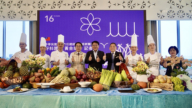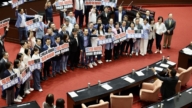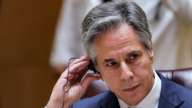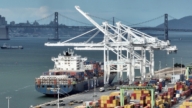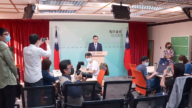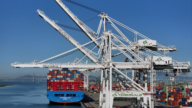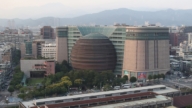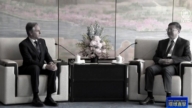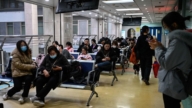【新唐人2016年07月22日讯】(新唐人记者陈远辉综合报导)近日,台湾总统蔡英文上任后第一次接受独家专访。她在专访中首度公开回应了“九二共识”,并呼吁北京尊重台湾的民主意愿,在处理两岸关系上能有更大的弹性。
蔡英文是在7月18日接受美国《华盛顿邮报》资深副主编Lally Weymouth专访。据华邮网页贴出的专访内容,访谈主要聚焦于两岸和台、美、中三边关系。
其中,记者提问,对于有些学者指出北京方面有给期限要求承认“九二共识”,蔡英文回应道:“两岸的问题很多人都很关注,很多人都有他们自己的观察,不过我相信,习近平主席做为一个国家的领导人,他应该有能力能够综合所有的情势,来做一个很好的决定,做一个正确的决定。尤其是台湾已经是一个非常民主的地方,民意的走向其实非常重要,所以设定期限,要求台湾政府违反民意去承受一些对方的条件,其实可能性是不大的,我也相信他们应该会有这样的认知。”
这是蔡英文首度对于是否承认“九二共识”有较清楚的回应。
至于对大陆领导人习近平的印象,蔡英文认为习近平整肃贪腐的勇气对中国社会的发展至关重要。她还表示,期待习能在处理两岸关系时展现多一点弹性,体会台湾系民主社会,台湾的领导人须遵照民众的意志。
蔡英文在今年5月20日就职以来,大陆方面迄今切断了过去做为两岸沟通的官方管道。被问到计划如何处理与北京的日常关系时,蔡英文表示,两岸的沟通一向有各种不同的渠道,不只官方的联系,还包括民间的接触。台湾方面尽力让两岸间的立场分歧差距缩到最小。
蔡英文说:“我相信中方会了解我就职时释出的善意”。她还指出,过去这段时间,台方极为审慎地处理与大陆的关系,未采取挑衅措施,确保不发生任何意外,同时盼透过各种不同的渠道,能逐步建立互信。
Lally Weymouth提及了“台湾认同”的议题,指蔡英文代表诸多认为自己是台湾人,而非中国人的年轻人,他们比较年长的世代还更倾向独立。她问道:“身为总统,您需要维持两岸关系稳定,同时您又须让支持者满意,这当中您要如何取得平衡?”
蔡英文回答称,台湾不同的世代和不同的族群有不同的中国观,但是他们在一件事上都有一个共识,那就是民主。
蔡英文接受华盛顿邮报专访全文:
(完全报导,请看:https://www.washingtonpost.com/opinions/2016/07/21/44b0a1a4-4e25-11e6-a422-83ab49ed5e6a_story.html)
Q: What is your impression of Chinese President Xi Jinping?
A: I think that Chairman Xi’s courage tackling corruption is an important matter in the development of Chinese society. I also look forward to him showing a bit more flexibility in dealing with cross-strait relations. I hope that he can appreciate that Taiwan is a democratic society in which the leader has to follow the will of the people.
Q: Some academics say Xi has a certain deadline by which he wants you to agree to the ’92 consensus. Is that right?
A: It isn’t likely that the government of Taiwan will accept a deadline for conditions that are against the will of the people.
Q: Since your inauguration in late May, the Chinese have cut off the official channel that was used to communicate between Taiwan and the mainland. How do you plan to handle day-to-day relations with Beijing?
A: We have always had diverse channels of communication across the strait. These include not just official communications but also people-to-people contacts. . . . There are differences between the positions of the two sides of the strait. In Taiwan, we have done our best to minimize that gap. I believe that the Chinese realize the goodwill we have put forth at the inauguration.
Q: It doesn’t seem that way. I think it was China’s Taiwan Affairs Office, part of the State Council, which said that your speech was “an incomplete exam.” There is no public indication that they appreciated your position. Are you, the president, in touch with your counterparts in the Chinese government?
A: Different levels of the government have different ways of communicating with their counterparts in China. At this stage, I cannot go into too much detail.
Q: Do you feel you are closing the gap between Taiwan and the People’s Republic of China?
A: Over this past period we have handled relations with China very carefully. We do not take provocative measures, we make sure that there are no surprises, and we hope that through channels of communication, we can gradually build up trust.
Q: You represent many of the youth who think of themselves as being Taiwanese, not Chinese. They are more pro-independence than the older generation. As president, you want to maintain cross-strait relations for stability, but at the same time, you must keep your followers happy. How do you balance these factors?
A: Different generations and people of different ethnic origins have different views on China. But they all agree on one thing. That is democracy.
Q: Is it fair that Washington has considered Taiwan an entity, not a country, since 1979, when the United States changed sides and recognized the People’s Republic of China (with its capital in Beijing) — in lieu of the Republic of China in Taiwan (with its capital in Taipei) — as China?
A: I am not clear what the U.S. means when they use the term “entity.” For us here in Taiwan, we believe that we are a country, a democratic country.
Q: So isn’t it unfair that Taiwan is not recognized in the world?
A: It is indeed unfair.
Q: American readers would find it hard to understand that you, as a Taiwanese president, are only allowed to come to the United States for 48 hours, and then only if it is a transit stop.
A: Indeed.
Q: There has reportedly been a drop-off in tourists from the mainland. Will that hurt your tourist industry?
A: We hope to have a more diverse source of tourists.
Q: China could bring more pressure on Taiwan if it chose to. They could frighten away your diplomatic allies by threatening to weaken your bonds with them. Are you worried about that?
A: If they do take economic measures to apply pressure to Taiwan, they will have to think about the price that they are going to pay. Because the surrounding countries will be looking very carefully at what measures China will take against Taiwan.
Q: So you think as far as your alliances go, they will stay as they are today?
A: We will do everything we can do to maintain those relations and make sure that our diplomatic allies feel that having diplomatic relations with Taiwan is worthwhile.
Q: Your predecessor, President Ma Ying-jeou, wanted to buy 66 F-16s from the United States. Even though 47 senators wrote in support of his request, nothing happened. Do you intend to repeat that request?
A: At the current stage what we need are surface ships, submarines and air defense systems, as well as defensive capabilities in terms of cybersecurity.
Q: I think Ma also asked for diesel submarines and got nowhere. Will you repeat that request?
A: We are trying to develop our own [submarines].
Q: When it comes to the U.S. election, Hillary Clinton or Donald Trump — who would be better for Taiwan?
A: As the leader of a different country, it is not very wise for us to comment on the presidential election in the U.S.
Q: I understand that the focus of your program is domestic — that you want to raise wages, to give people more time off. But with a growth rate under 1 percent, how can you spur the economy while delivering increased social services?
A: There is no panacea for this. I think Taiwan’s economy needs an overall structural readjustment. Our new model focuses on innovation and research. This is different from our growth model in the past, which was centered on the manufacturing industry.
Q: Isn’t China your No. 1 trading partner?
A: China is still our largest trading partner; however, complementarity between our economies is decreasing. We had the ability to organize a manufacturing process, and then we moved our manufacturing capability to China to make use of their labor pool. But now the situation is very different. [Chinese] labor costs are increasing, and China has their own capability.
Q: So China has become a competitor of Taiwan?
A: They are more and more our competitors.
Q: I saw that you expressed disappointment over the ruling by the Permanent Court of Arbitration in The Hague on the South China Sea. It held that Taiping Island, which you claim as part of Taiwan, is a rock, not an island, and thus cannot enjoy an exclusive economic zone. Will you abide by the ruling?
A: We will not accept their decision. There are a couple of reasons for that. Taiwan is an important interested party in this case, but we were not invited to participate in the proceedings. Secondly, we found it unacceptable that we were referred to as the Taiwan Authority of China. The third reason is that [Taiping Island really is] an island.
Q: You are the first woman in Asia who does not come from a political family to be elected president of a country. How did you do it?
A: I think that my emergence as a leader is closely related to the development of Taiwan’s democracy. Taiwan’s democracy was a gradual development. It was done from the bottom up. Therefore a lot of the more successful political leaders come from civil society, those that are closer to the grass-roots level of the public.
Q: It must have been difficult to be a woman leader in such a male-dominated society.
A: Yes, to a certain extent. But I think that the society and our democracy are mature enough to place emphasis on the quality and the value of the individual politician, rather than their gender. Some people will find it fashionable to have a woman leader, but I think the reason people chose me as the leader of this country is because my policies and my values suit the needs of Taiwan today. We represent people who want to have change in the society. For years, this place has been dominated politically by a single party, the Kuomintang. People now want the place to be more democratic. They want to place more emphasis on human rights and transparency in terms of government decision-making. This is different from the way the government conducted business in the days when this was pretty much an authoritarian place.
Q: The KMT had a long military rule.
A: The expectation of the people now is very different. They want democracy.
责任编辑:赵云


